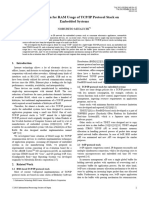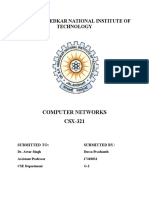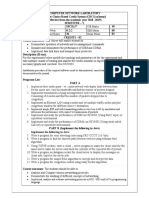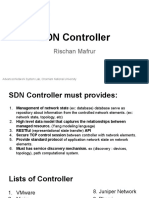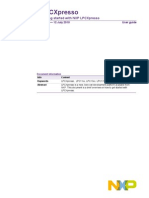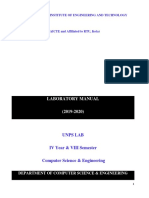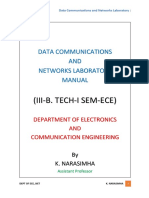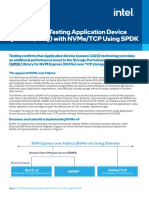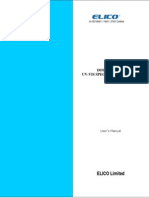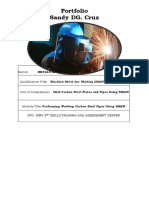TCPIPPB
TCPIPPB
Uploaded by
ykwonCopyright:
Available Formats
TCPIPPB
TCPIPPB
Uploaded by
ykwonCopyright
Available Formats
Share this document
Did you find this document useful?
Is this content inappropriate?
Copyright:
Available Formats
TCPIPPB
TCPIPPB
Uploaded by
ykwonCopyright:
Available Formats
NXP Semiconductors Document Number: 1.
0
Product Brief Rev 3.0,
NXP TCP/IP Stack Product Brief
Contents
1. Software Product Overview ............................................... 1
2. Software Content ............................................................... 2 1. Software Product
3. Supported Targets .............................................................. 3
4. Quality, Standards Compliance and Testing Approach...... 4 Overview
5. Document Information ....................................................... 5
The TCP/IP stack is a light-weight implementation
of the TCP/IP protocol suite. It is a port of lwIP stack
for NXP automotive processors.
lwIP was originally written by Adam Dunkels at the
Computer and Networks Architectures (CNA) lab of
the Swedish Institute of Computer Science but now is
being actively developed by a team of developers
distributed world-wide headed by Kieran
Mansley. The development homepage has the latest
news and releases: http://
savannah.nongnu.org/projects/lwip
The focus of the lwIP TCP/IP implementation is to
reduce the RAM usage while still having a fullscale
TCP.
lwIP is freely available (under a BSD-style license)
in C source code format and can be downloaded
from the development homepage.
.
NXP TCP/IP Stack Product Brief
Rev 3.0, 02/2023
NXP Semiconductors 1
PUBLIC
@NXP Semiconductors N.V.
Uncontrolled if printed
Figure 1. Architecture of TCP/IP stack
2. Software Content
lwIP has three application programming interfaces (APIs) designed for different purposes:
• Raw API is a native lwIP API. This API provides the best performance and minimal code
size, but adds some complexity to application design because the handling of asynchronous
events is done using callbacks.
• Netconn API is a high-level sequential API built on top of Raw API. The Netconn API
enables multithreaded operations and therefore it requires an operating system (RTOS). It
offers increased usability at the expense of lower performance and higher memory
footprint.
• BSD Socket API Berkeley-like Socket API (developed on top of the Netconn API). It
offers portability while sharing the same drawbacks as Netconn API.
NXP TCP/IP Stack Product Brief
Rev3.0, 02/2023
2 NXP Semiconductors
PUBLIC
3. Supported Targets
The following table shows the supported platforms for TCP/IP stack.
Table 1. Supported platforms, toolchains, etc.
Product Devices Toolchains IDEs Supported OS
NXP Software
TCP/IP stack for MPC5744P GNU C S32 Design Studio S32 SDK for FreeRTOS
MPC5744P MPC5744P
TCP/IP stack for MPC5748G GNU C S32 Design Studio S32 SDK for FreeRTOS
MPC5748G MPC5748G
TCP/IP stack for S32K148 GNU C S32 Design Studio S32 SDK for S32K148 FreeRTOS
S32K148
TCP/IP stack for S32R274 GNU C S32 Design Studio S32 SDK for S32R274 FreeRTOS
S32R274
TCP/IP stack for MPC5746R GNU C S32 Design Studio S32 SDK for FreeRTOS
MPC5746R MPC5746R
TCP/IP stack for MPC5777C GNU C S32 Design Studio S32 SDK for FreeRTOS
MPC5777C MPC5777C
TCP/IP stack for S32V234 GNU C S32 Design Studio S32 SDK for S32V234 FreeRTOS
S32V234
TCP/IP stack for S32R294 GNU C S32 Design Studio SDK drivers for FreeRTOS
S32R294 S32R294
TCP/IP stack for S32G274 GNU C S32 Design Studio RTD drivers for FreeRTOS
S32G274 S32G274
TCP/IP stack for SJA1110 GNU C S32 Design Studio SDK drivers for FreeRTOS
SJA1110 SJA1110
TCP/IP stack for S32K344 GNU C, S32 Design Studio RTD drivers for FreeRTOS
S32K344 GHS, S32K344
DIAB
TCP/IP stack for SAF85XX GNU C, S32 Design Studio RTD drivers for NXPOS
SAF85XX GHS, SAF85XX
DIAB
TCP/IP stack for S32R41 GNU C, S32 Design Studio RTD drivers for NXPOS
S32R41 GHS, S32R41
DIAB
TCP/IP stack for SAF86XX GNU C, S32 Design Studio RTD drivers for NXPOS
SAF86XX GHS, SAF86XX
DIAB
TCP/IP stack for S32ZE GNU C, S32 Design Studio RTD drivers for S32ZE FreeRTOS
S32ZE GHS,
DIAB
TCP/IP stack for S32G3 GNU C, S32 Design Studio RTD for S32G FreeRTOS
S32G S32G2 GHS,
DIAB
NXP TCP/IP Stack Product Brief
Rev 3.0, 02/2023
NXP Semiconductors 3
PUBLIC
@NXP Semiconductors N.V.
Uncontrolled if printed
4. Quality, Standards Compliance and Testing Approach
TCP/IP Stack is developed according to NXP Software Development Processes that are Automotive-
SPICE, IATF 16949 and ISO9001 compliant.
NXP TCP/IP Stack Product Brief
Rev3.0, 02/2023
4 NXP Semiconductors
PUBLIC
5. Document Information
Table 2. Revision History
Revision Date Description
Rev 1.0 07/07/2021 Initial version
Rev 2.0 26/09/2022 Add new product(SAF85/SAF86/ S32ZE)
Rev 3.0 07/02/2023 Update S32G product
NXP TCP/IP Stack Product Brief
Rev 3.0, 02/2023
NXP Semiconductors 5
PUBLIC
@NXP Semiconductors N.V.
Uncontrolled if printed
How to Reach Us: Information in this document is provided solely to enable system and software
implementers to use NXP products. There are no express or implied copyright
Home Page: licenses granted hereunder to design or fabricate any integrated circuits based on
nxp.com the information in this document. NXP reserves the right to make changes
without further notice to any products herein.
Web Support:
nxp.com/support NXP makes no warranty, representation, or guarantee regarding the suitability of
its products for any particular purpose, nor does NXP assume any liability
arising out of the application or use of any product or circuit, and specifically
disclaims any and all liability, including without limitation consequential or
incidental damages. “Typical” parameters that may be provided in NXP data
sheets and/or specifications can and do vary in different applications, and actual
performance may vary over time. All operating parameters, including “typicals,”
must be validated for each customer application by customer’s technical experts.
NXP does not convey any license under its patent rights nor the rights of others.
NXP sells products pursuant to standard terms and conditions of sale, which can
be found at the following address: nxp.com/SalesTermsandConditions.
NXP, the NXP logo, NXP SECURE CONNECTIONS FOR A SMARTER WORLD,
COOLFLUX, EMBRACE, GREENCHIP, HITAG, I2C BUS, ICODE, JCOP, LIFE VIBES,
MIFARE, MIFARE CLASSIC, MIFARE DESFire, MIFARE PLUS, MIFARE FLEX,
MANTIS, MIFARE ULTRALIGHT, MIFARE4MOBILE, MIGLO, NTAG, ROADLINK,
SMARTLX, SMARTMX, STARPLUG, TOPFET, TRENCHMOS, UCODE, Freescale, the
Freescale logo, AltiVec, C 5, CodeTEST, CodeWarrior, ColdFire, ColdFire+, C Ware,
the Energy Efficient Solutions logo, Kinetis, Layerscape, MagniV, mobileGT, PEG,
PowerQUICC, Processor Expert, QorIQ, QorIQ Qonverge, Ready Play, SafeAssure, the
SafeAssure logo, StarCore, Symphony, VortiQa, Vybrid, Airfast, BeeKit, BeeStack,
CoreNet, Flexis, MXC, Platform in a Package, QUICC Engine, SMARTMOS, Tower,
TurboLink, and UMEMS are trademarks of NXP B.V. All other product or service names
are the property of their respective owners. ARM, AMBA, ARM Powered, Artisan,
Cortex, Jazelle, Keil, SecurCore, Thumb, TrustZone, and μVision are registered
trademarks of ARM Limited (or its subsidiaries) in the EU and/or elsewhere. ARM7,
ARM9, ARM11, big.LITTLE, CoreLink, CoreSight, DesignStart, Mali, mbed, NEON,
POP, Sensinode, Socrates, ULINK and Versatile are trademarks of ARM Limited (or its
subsidiaries) in the EU and/or elsewhere. All rights reserved. Oracle and Java are
registered trademarks of Oracle and/or its affiliates. The Power Architecture and
Power.org word marks and the Power and Power.org logos and related marks are
trademarks and service marks licensed by Power.org.
NXP B.V. 2023. All rights reserved.
Document Number: 1.0
Rev 3.0
You might also like
- Creating A Raspberry Pi-Based Beowulf Cluster: Joshua KiepertDocument15 pagesCreating A Raspberry Pi-Based Beowulf Cluster: Joshua KiepertMalumbo SinkambaNo ratings yet
- Software-Defined Networks: A Systems ApproachFrom EverandSoftware-Defined Networks: A Systems ApproachRating: 5 out of 5 stars5/5 (1)
- Ipsj SLDM13160032Document6 pagesIpsj SLDM13160032dukeNo ratings yet
- CS8581 Lab ManualDocument45 pagesCS8581 Lab ManualJai Keerthick57% (7)
- Computer Networks Lab Manual: 6 Semester, B.EDocument57 pagesComputer Networks Lab Manual: 6 Semester, B.Emkarthikeyan7075No ratings yet
- N1404W NXP SW Libraries For NFC Readers - Introduction v1.0 PublicDocument39 pagesN1404W NXP SW Libraries For NFC Readers - Introduction v1.0 PublicLee RickHunterNo ratings yet
- Implementation of IPv6 in Embedded Device Using LWIP TCPIP StackDocument5 pagesImplementation of IPv6 in Embedded Device Using LWIP TCPIP StackEditor IJRITCCNo ratings yet
- Oai Oaisim DescDocument33 pagesOai Oaisim DescBill CheimarasNo ratings yet
- FEB-14-19-Implementation and Porting of Light Weight TCPIP For Embedded Web Server - EWSDocument6 pagesFEB-14-19-Implementation and Porting of Light Weight TCPIP For Embedded Web Server - EWSKumar Goud.KNo ratings yet
- Socket ProgrammingDocument6 pagesSocket ProgrammingJuan CarlosNo ratings yet
- Dr. B.R. Ambedkar National Institute of Technology: Computer Networks CSX-321Document34 pagesDr. B.R. Ambedkar National Institute of Technology: Computer Networks CSX-321Gaurav SachdevaNo ratings yet
- Microchip TCP/IP Lite Stack: Authors: Janaki Kuruganti, Alin Stoicescu, Marius Cristea, Microchip Technology IncDocument30 pagesMicrochip TCP/IP Lite Stack: Authors: Janaki Kuruganti, Alin Stoicescu, Marius Cristea, Microchip Technology IncCarlos Daniel Rodriguez100% (1)
- 2 FreeRTOS LwIP Zyny ZedboardDocument18 pages2 FreeRTOS LwIP Zyny Zedboardkhin600No ratings yet
- Development Board For LPC1768 SeriesDocument4 pagesDevelopment Board For LPC1768 SeriesMC. Rene Solis R.100% (1)
- CN Lab ManualDocument57 pagesCN Lab ManualMohammad Ismail NaazNo ratings yet
- 18csl57 Cn@Azdocuments - inDocument99 pages18csl57 Cn@Azdocuments - in4GH19CS045 Shashikumar H CNo ratings yet
- Librervac: Free Firmware For Robotic Vacuum CleanersDocument54 pagesLibrervac: Free Firmware For Robotic Vacuum CleanersAndrew FreemanNo ratings yet
- Lwip PortDocument10 pagesLwip PortKarthik KichuNo ratings yet
- 5d-MC Final ReportDocument26 pages5d-MC Final ReportsurvivalofthepolyNo ratings yet
- Open Network Linux For DevelopersDocument50 pagesOpen Network Linux For DevelopersYogesh YokeshNo ratings yet
- PIC Intro 0Document7 pagesPIC Intro 0Raghavadeep ReddyNo ratings yet
- 8.1. Lab5Document8 pages8.1. Lab5Mai Huy HoàngNo ratings yet
- Dishivam9876mbimph, GOVINDASAMY512022AJOAIR1870Document8 pagesDishivam9876mbimph, GOVINDASAMY512022AJOAIR1870ahmed.haddadNo ratings yet
- MpiDocument17 pagesMpiAtiv MutsaqovNo ratings yet
- Cs3591&Cn LabDocument68 pagesCs3591&Cn Labsibi43125No ratings yet
- Osa Eurecom KaltenbergerDocument51 pagesOsa Eurecom KaltenbergerBill CheimarasNo ratings yet
- Network ProgrammingDocument168 pagesNetwork ProgrammingNoorullah Shariff100% (1)
- ConclusionDocument19 pagesConclusionu_upalNo ratings yet
- Department of Information Technology Subject: SL Class/Sem: T.E./VI Roll Number Batch: List of Experiments No. Name No. Date RemarkDocument19 pagesDepartment of Information Technology Subject: SL Class/Sem: T.E./VI Roll Number Batch: List of Experiments No. Name No. Date RemarkAvdhut TarwalNo ratings yet
- SDN Controller and Implementation PDFDocument63 pagesSDN Controller and Implementation PDFhadje benilhaNo ratings yet
- Experiment 1 AIM: Introduction To Discrete Event Simulation Tools Ns2/s3, Omnet++ and Installation of Ns3Document30 pagesExperiment 1 AIM: Introduction To Discrete Event Simulation Tools Ns2/s3, Omnet++ and Installation of Ns3Om DwivediNo ratings yet
- Lpcxpresso: Getting Started With NXP LpcxpressoDocument44 pagesLpcxpresso: Getting Started With NXP LpcxpressojtraohydNo ratings yet
- Decnet To TCP Kab Rev1aDocument6 pagesDecnet To TCP Kab Rev1amnprashuNo ratings yet
- F Pga Implemented Reduced Ethernet MacDocument5 pagesF Pga Implemented Reduced Ethernet MacSaavin AbeygunawardenaNo ratings yet
- Creating.a.raspberry - Pi Based - Beowulf.cluster v2Document17 pagesCreating.a.raspberry - Pi Based - Beowulf.cluster v2Geuseppe González CárdenasNo ratings yet
- Software and Hardware Selection Guide ADRV9001 Adrv9001 Software and Hardware Selection GuideDocument2 pagesSoftware and Hardware Selection Guide ADRV9001 Adrv9001 Software and Hardware Selection GuiderajNo ratings yet
- 8cs5a Unps Lab Manual 1Document64 pages8cs5a Unps Lab Manual 1Rooparam ChoudharyNo ratings yet
- DCN Lab Manual-JNUH HyderabadDocument69 pagesDCN Lab Manual-JNUH HyderabadAkkonduru Kumar100% (3)
- IEEE 802.15.4 Packet Analysis With Wireshark and Off-The-Shelf HardwareDocument4 pagesIEEE 802.15.4 Packet Analysis With Wireshark and Off-The-Shelf HardwareNischith HosmaneNo ratings yet
- Serialized DLMS Over TCP PRIME GatewayDocument12 pagesSerialized DLMS Over TCP PRIME GatewayVNo ratings yet
- ContikiDocument12 pagesContikiAni KaNo ratings yet
- Computer Network Lab PDFDocument79 pagesComputer Network Lab PDFSAFIKURESHI MONDALNo ratings yet
- LinuxDspTools GettingStartedGuide v98Document36 pagesLinuxDspTools GettingStartedGuide v98asdNo ratings yet
- Circuitpython On Orangepi LinuxDocument57 pagesCircuitpython On Orangepi LinuxHoai Pham HongNo ratings yet
- Lightweight IPDocument1 pageLightweight IPJekil HansoraNo ratings yet
- Low-Cost Development Platform For 32-Bit LPC Microcontroller Family Low-Cost Development Platform For 32-Bit LPC Microcontroller FamilyDocument2 pagesLow-Cost Development Platform For 32-Bit LPC Microcontroller Family Low-Cost Development Platform For 32-Bit LPC Microcontroller FamilyAnonymous TWZgvcKz9No ratings yet
- Group-A 1Document6 pagesGroup-A 1atulj9326No ratings yet
- Tting StartedDocument48 pagesTting StartedChaitanya MotlaNo ratings yet
- NS-2 Installation in 6 StepsDocument2 pagesNS-2 Installation in 6 StepsMary Sriryn100% (1)
- NS-2 TCP Implementation With Congestion Control Algorithms From LinuxDocument4 pagesNS-2 TCP Implementation With Congestion Control Algorithms From LinuxSenthilKumar RamalingamNo ratings yet
- Adq Using SPDK SB UnlockedDocument13 pagesAdq Using SPDK SB Unlocked张凯强No ratings yet
- Labspg 2442Document75 pagesLabspg 2442Ala JebnounNo ratings yet
- 6LowPAN ArchitectureDocument5 pages6LowPAN ArchitectureReiko11No ratings yet
- LPC2300/LPC2400 TCP/IP OverviewDocument26 pagesLPC2300/LPC2400 TCP/IP OverviewsafasabaNo ratings yet
- Wireless ns3 Assignment2Document1 pageWireless ns3 Assignment2Sovann DoeurNo ratings yet
- Intermediate C Programming for the PIC Microcontroller: Simplifying Embedded ProgrammingFrom EverandIntermediate C Programming for the PIC Microcontroller: Simplifying Embedded ProgrammingNo ratings yet
- Programming Arduino Projects with the PIC Microcontroller: A Line-by-Line Code Analysis and Complete Reference Guide for Embedded Programming in CFrom EverandProgramming Arduino Projects with the PIC Microcontroller: A Line-by-Line Code Analysis and Complete Reference Guide for Embedded Programming in CNo ratings yet
- CISCO PACKET TRACER LABS: Best practice of configuring or troubleshooting NetworkFrom EverandCISCO PACKET TRACER LABS: Best practice of configuring or troubleshooting NetworkNo ratings yet
- C Programming for the PIC Microcontroller: Demystify Coding with Embedded ProgrammingFrom EverandC Programming for the PIC Microcontroller: Demystify Coding with Embedded ProgrammingNo ratings yet
- Chapter 1 - Introduction To CorrosionDocument36 pagesChapter 1 - Introduction To Corrosionmotasem100% (2)
- SL210 Users ManualDocument59 pagesSL210 Users ManualDeepak Narayan Paithankar64% (11)
- Promotion Strategies of McdonaldDocument34 pagesPromotion Strategies of McdonaldIndira Thayil100% (2)
- Credit Point Sheet - 0Document3 pagesCredit Point Sheet - 0Chandra SekharNo ratings yet
- Literature ReviewDocument16 pagesLiterature Reviewjithinks0No ratings yet
- Labeo RohitaDocument4 pagesLabeo RohitaTuans Muda DaniNo ratings yet
- Objective Estimation of The Radius of The Outermost Closed Isobar in Tropical CyclonesDocument21 pagesObjective Estimation of The Radius of The Outermost Closed Isobar in Tropical CyclonesElena HernandezNo ratings yet
- Borang Transit PBD Bahasa Inggeris Tahun 5Document4 pagesBorang Transit PBD Bahasa Inggeris Tahun 5Nittiya ShinuwashinNo ratings yet
- Guidelines and Best Practices For The Installation and Maintenance of Data Networking EquipmentDocument96 pagesGuidelines and Best Practices For The Installation and Maintenance of Data Networking EquipmentOluwaseun AlhassanNo ratings yet
- St. Paul University Surigao: Practice of Patriotic ValuesDocument4 pagesSt. Paul University Surigao: Practice of Patriotic ValuesChristian GarciaNo ratings yet
- 1 SATIP-NDE-RT-01 Radiographic Testing-Rev 1Document1 page1 SATIP-NDE-RT-01 Radiographic Testing-Rev 1KirubhakarPooranamNo ratings yet
- 75914199-2 - Fu-10-Pad - Eyes-Mpi, 20-May-2024Document1 page75914199-2 - Fu-10-Pad - Eyes-Mpi, 20-May-2024Mohamed El-SawahNo ratings yet
- Exam Time Table Nov 2018Document286 pagesExam Time Table Nov 2018Karthi Keyan RNo ratings yet
- Smaw Sandy DG CruzDocument129 pagesSmaw Sandy DG CruzEmmer100% (1)
- Important Tips On The Calibration and Adjustment of The Testo 270Document1 pageImportant Tips On The Calibration and Adjustment of The Testo 270Abu AlifNo ratings yet
- Super Aero City (Bare Chassis)Document5 pagesSuper Aero City (Bare Chassis)Philippine Bus Enthusiasts SocietyNo ratings yet
- K. Chitra, Et Al PDFDocument5 pagesK. Chitra, Et Al PDFNeena Bharti0% (1)
- 4-Module 2 - Objectives of Shunt Connected FCATS Devices-04!08!2023Document20 pages4-Module 2 - Objectives of Shunt Connected FCATS Devices-04!08!2023saran killerNo ratings yet
- Transforming E-R Diagrams Into RelationsDocument26 pagesTransforming E-R Diagrams Into RelationsArivian MangilayaNo ratings yet
- List of Empanelled HCOs - Patna (Nov 2022)Document9 pagesList of Empanelled HCOs - Patna (Nov 2022)Shweta jainNo ratings yet
- Chapter 1 3 W. Questionnaire 1Document53 pagesChapter 1 3 W. Questionnaire 1Banjo De los SantosNo ratings yet
- Assessing The Information Needs of The CompanyDocument2 pagesAssessing The Information Needs of The CompanyAlexNo ratings yet
- Cable Connection & Sealing of Sacrificial AnodesDocument5 pagesCable Connection & Sealing of Sacrificial AnodesmandiNo ratings yet
- Daily Express 2011 04 25Document64 pagesDaily Express 2011 04 25Ник ЧенNo ratings yet
- MAPEH 8 4th QTR PTDocument6 pagesMAPEH 8 4th QTR PTRuth Aramburo100% (1)
- NOMM For Emergency TRO and Expedited DiscoveryDocument19 pagesNOMM For Emergency TRO and Expedited DiscoveryNYPNo ratings yet
- Manual de Calidad GeDocument28 pagesManual de Calidad GeMarco Antonio MoncerrateNo ratings yet
- Chemical Reactions Balancing Equations ActivityDocument3 pagesChemical Reactions Balancing Equations ActivityKaty Ospina PolaniaNo ratings yet
- Four Types of Phrasal VerbsDocument5 pagesFour Types of Phrasal VerbsNicoletaNicoleta100% (1)
- Enzymes ProbsDocument21 pagesEnzymes ProbsAnonymous sVNvV7Q100% (1)


